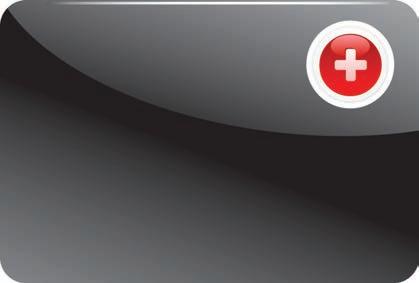
7 minute read
Health and Medical
45) The Emergency Room (ER)
Know the location of an emergency room (ER) close to your home. ERs have to treat a patient in immediate medical need, including people who cannot pay. Emergency rooms are open 24 hours a day. Using the ER can be expensive, especially if you don’t have health insurance. If you do not need emergency care, call a local clinic or your doctor to make an appointment. Some conditions that may require immediate medical attention include: - Difficulty breathing. - Fainting or sudden dizziness. - Changes in vision. - Sudden or severe pain. - Pain or pressure in your chest. - Bleeding that will not stop. Information you share with doctors, nurses and hospital workers is kept confidential. Urgent care centers treat patients who have an injury or illness that requires immediate care but is not serious enough to visit to an ER. Urgent care can be faster and less expensive than a visit to the ER. Urgent care centers are usually not open all the time.
47) The Healthcare System
There are many options for health insurance. Some employers pay for part or all of their employees’ health insurance costs. Buying your own health insurance can be expensive, but it can reduce large medical bills. Here are some words you should understand: - Premiums – the amount you pay monthly. - Co-pay – the fee you pay every time you receive medical services, such as $30 for a regular visit or $100 for the ER. Your insurance pays for the rest of the basic service. - Deductible – the amount that you have to pay for expenses before your insurance pays anything. Most communities have clinics and Public Health departments that offer affordable health
46) Urgent Care Centers

care.
48) Filling Out Medical Forms
When you see a doctor or fill out medical forms you will be asked about: - Allergies you have to medications. - Health history. - How much you drink and smoke. - Family health conditions. - Medications you are taking.
49) Communicating With Doctors
Don’t be afraid to ask your doctor questions about anything. Questions you can ask may include: - When should I start to feel better? - How can I prevent this from happening again? - Are there symptoms I should look for?
50) Medication & Labels
You need to get a prescription from a doctor for special medication. You can pick up prescription medicine at a pharmacy. You will probably get a discount if you have health insurance. You can buy over-the-counter medicine like Tylenol and Advil at stores without a prescription. All medicine comes with directions on the label that tell you: - How to take the medicine. - How much to take, such as number of pills. - How many times a day to take it. - For how many days or weeks. Check the expiration dates and do not use medicine that has expired.
51) Depression
Depression is common, and symptoms can include: - Feeling sad and tired a lot. - Feeling negative and guilty. - Loss of interest in activities. - Difficulty controlling moods. - Not being able to sleep or sleeping too much. - Thoughts of suicide. Many cases can be treated effectively. If you think you may be suffering from depression, talk to a health clinic immediately. If you think a friend is suicidal, call 911 if they are in immediate danger.
52) Counseling
Going to a counselor or therapist is common. Counselors can help with family issues, individual issues, depression, and sadness. Many immigrants experience stress when adapting to a new culture. Local social services or your health care provider may offer affordable mental health services.
53) Vaccinations & Check-ups
People often go to a doctor or clinic once a year for a checkup to know about health problems before they become serious. Doctors do tests, using blood or other physical samples. Schools require children to receive vaccinations.
(50) Medicine Label example

54) HIV & AIDS
HIV is the virus that causes AIDS. It can be passed from an infected person to another person through blood, semen, vaginal fluids, and breast milk. There is risk for spreading HIV by: - Having sex without using protection. - Sharing needles and equipment used for injecting drugs. Most areas have clinics that conduct free tests for HIV. It is the law that you have to tell your doctor if you are HIV positive.
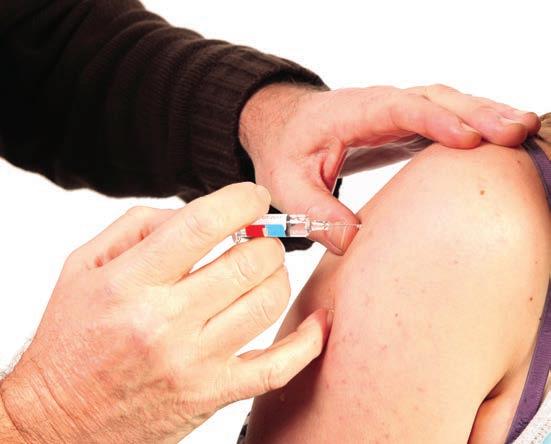
(53) Vaccinations
55) Spreading Illness
Many people are careful about spreading illnesses. Wash your hands with soap and water: - Before preparing or eating food. - After going to the bathroom. - After changing diapers. - After blowing your nose, coughing, or sneezing. - After touching garbage. Cover your mouth and nose with your elbow when you cough or sneeze.
56) Using a Thermometer
You can take your temperature by using an oral thermometer under your tongue or armpit. For most people, normal body temperature in degrees Fahrenheit is 98.6° F. Anything above that is considered a fever. In general, for adults a fever of 103° F or more is considered dangerous. You can purchase a thermometer at pharmacies or grocery stores. If you are not sure how dangerous the fever is, call a doctor or health clinic.
(56)
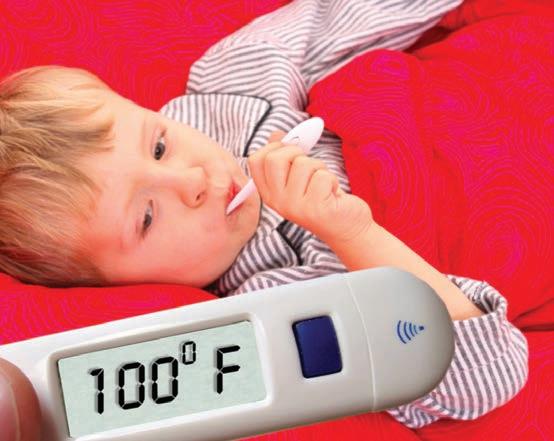
Thermometer (55) Spreading illness
57) First Aid

Always call 911 for emergencies. To stop bleeding cover the wound with something clean and apply a little pressure. A choking victim needs help immediately. The sign for choking is two hands placed on the throat. You can use a series of abdominal thrusts to help anyone over one year old who is choking on an object. Follow these steps: 1. From behind, make a fist and place the thumb side of your fist below the rib cage and above the navel of the victim. 2. Grasp your fist with the other hand and make quick upward thrusts until the object is removed. You can learn more at CPR and First Aid classes in your community.
58) General Safety Practices
Ways you can prevent accidents and sicknesses: - Don’t have electric appliances like a toaster or hair dryer near a sink or shower . - Never put metal or aluminum in the microwave. - Never mix dif ferent cleaning products. - Keep hot food hot and cold food cold to avoid bacteria growth. - Do not let raw meat touch other foods and utensils. - Bend your knees and keep your back vertical when lifting heavy objects. - W ear a helmet while biking. - Make sure you understand all safety instructions at work. - Be extra careful walking on ice and other slippery surfaces.
(57) First Aid (57) Abdominal Thrust
(58)

Bike helmets

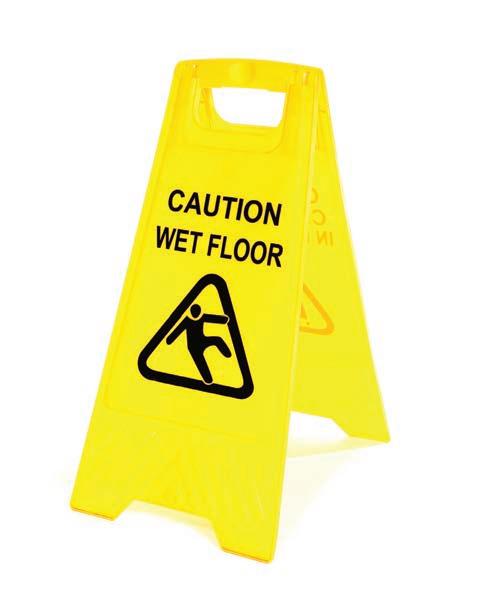

59) Dental Care
Basic dental care involves: - Brushing two to three times a day and flossing your teeth every day. - Seeing your dentist for checkups and cleanings one or two times a year. - Eating foods high in whole grains. - Eating 5 servings of vegetables and fruits each day. - Eating food high in calcium or taking a calcium pill every day.

60) Exercise
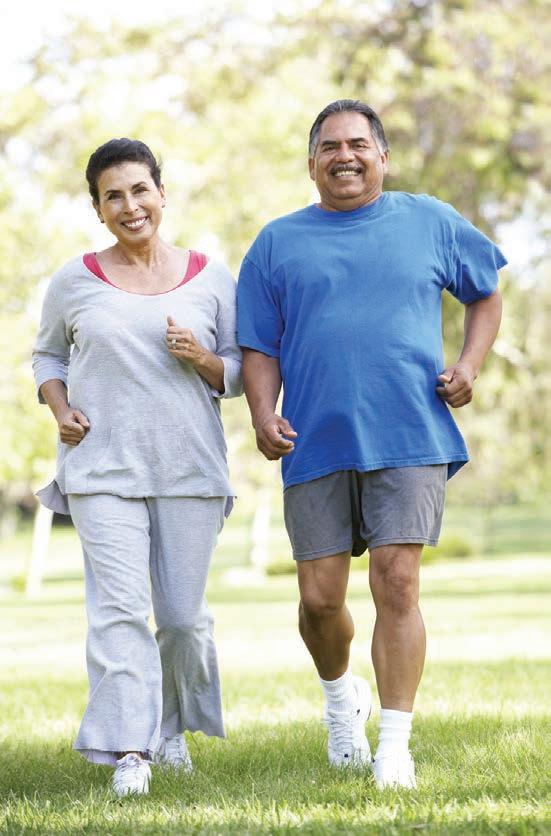
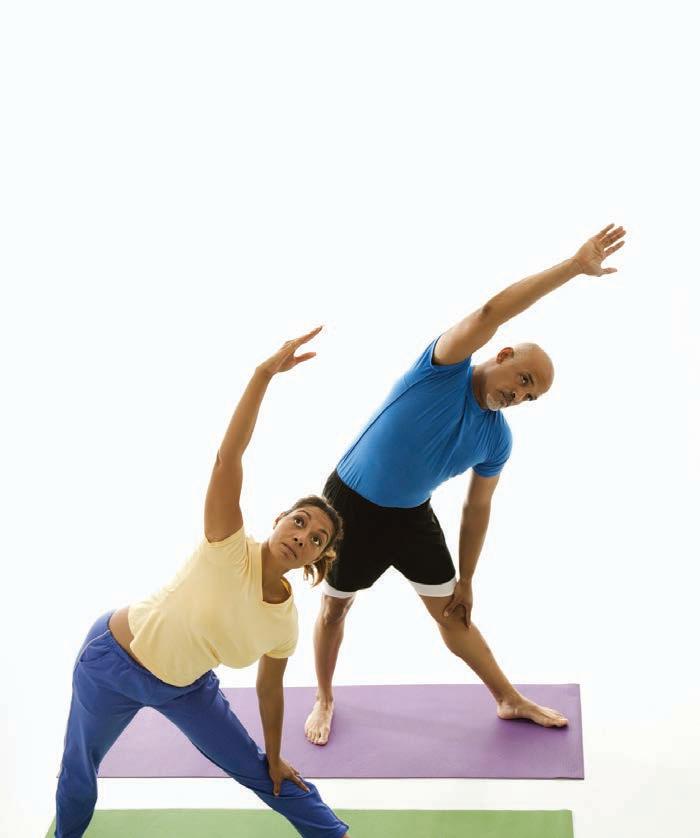
People run, bike, and practice other forms of exercise in public. Recreation centers and fitness clubs typically offer exercise classes. Exercise helps you feel healthy physically and mentally. Exercise helps reduce stress and can help you sleep better. Try to exercise three to six days a week for 30 minutes or more at a time.
61) Watch What You Eat
Read nutrition labels and know what you are eating and drinking. Do not eat anything that has expired. Expiration dates are always written in month/day/year format (November 18, 1977 is written as 11/18/1977). The average person should eat between 1500 and 2500 calories a day. Do not eat a lot of foods high in trans fat, fat, sugar, sodium and cholesterol. Food is often served in large portions. You don’t have to finish your meal. At restaurants people often take home the extras to eat later. Drink a lot of water. Water that comes out of sinks is usually safe to drink.
62) Cigarettes

Smoking harms the body and causes many diseases. Smoking can also damage teeth and cause bad breath. Cigarettes are expensive and smoking is viewed negatively by many people. It is prohibited in many public places.
63) Alcoholism
Drinking a lot of alcohol can harm your body and your relationships. It can also lead to legal problems, like being arrested for drinking and driving. There are support groups like Alcoholics Anonymous (AA) to help alcoholics. Alcoholics often need support from family or friends. Alcoholism is viewed negatively, but getting help is viewed positively.








